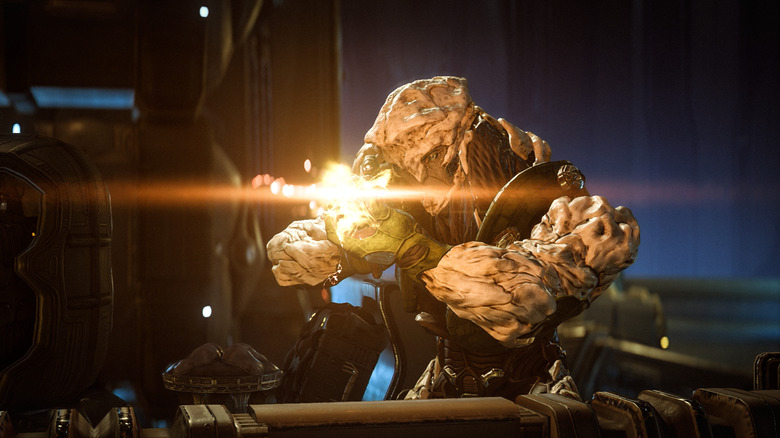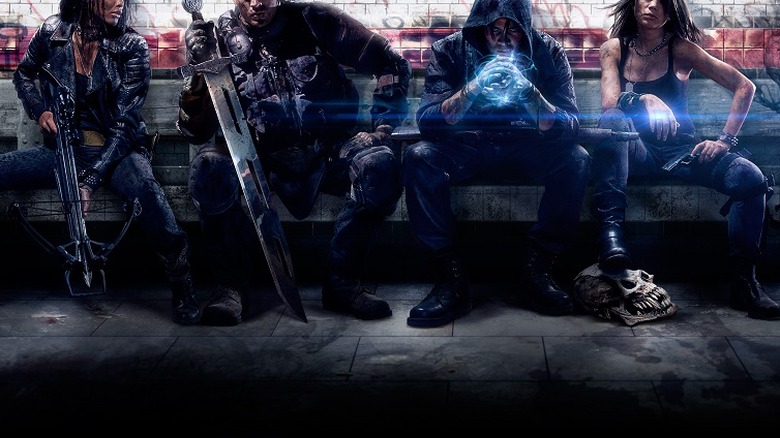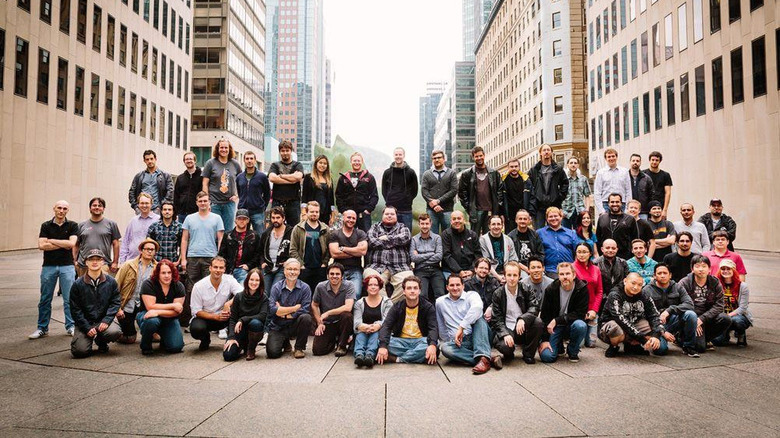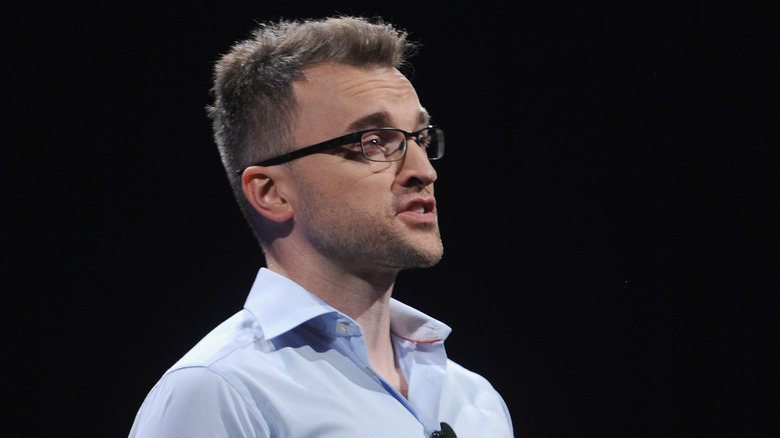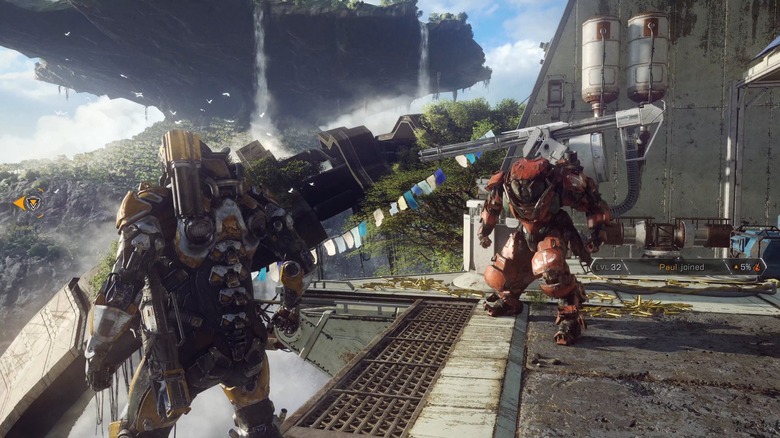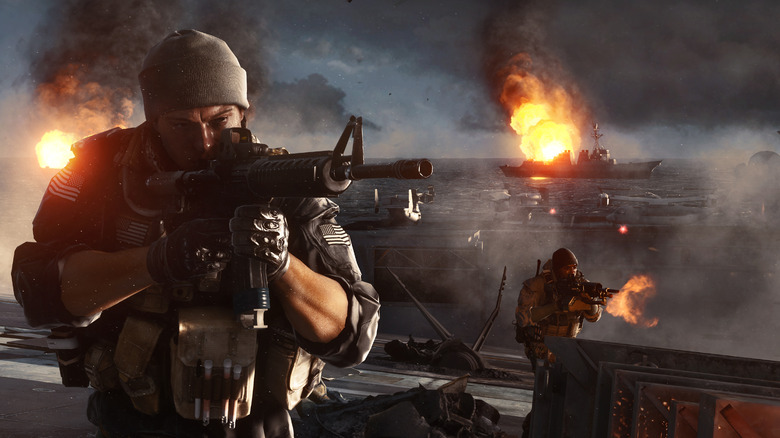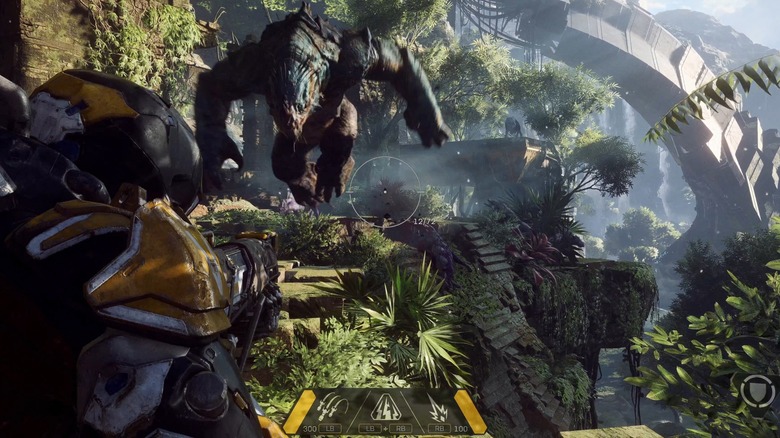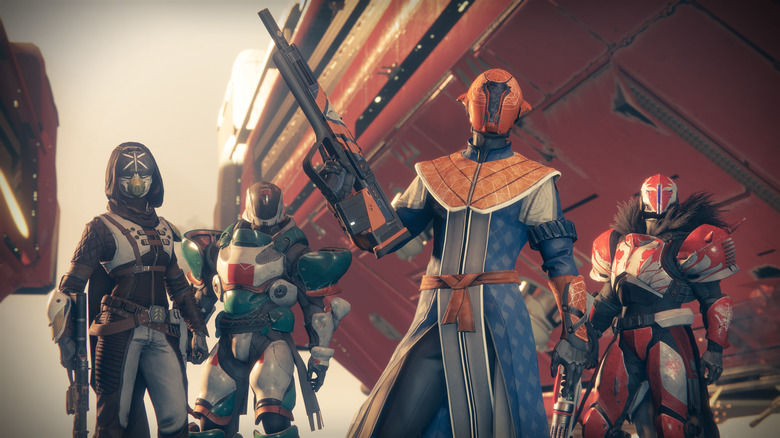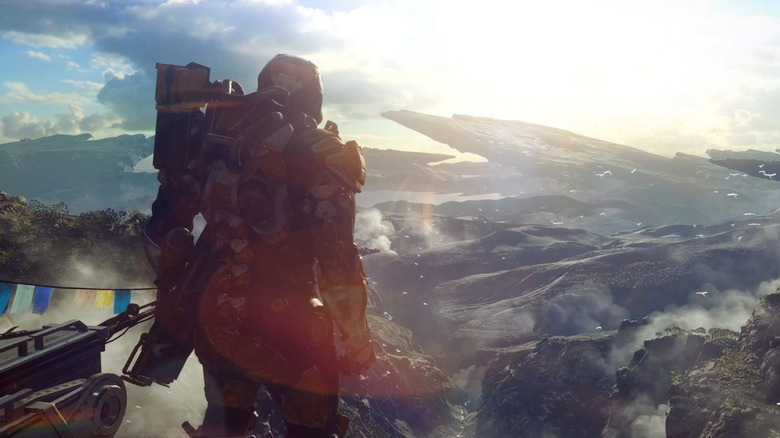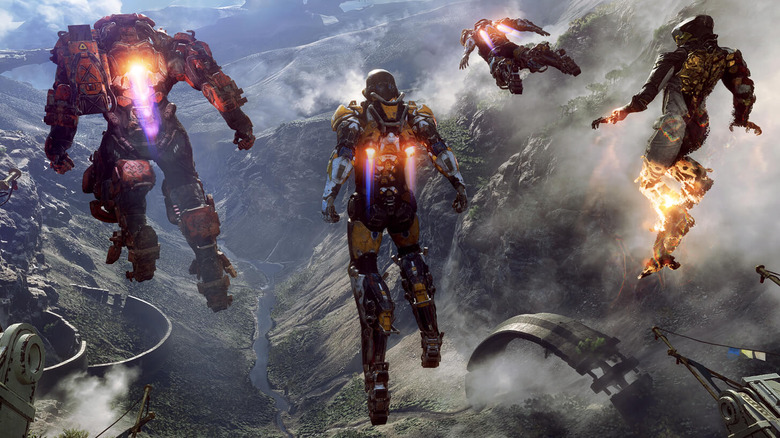How Anthem Could Be BioWare's Funeral
BioWare makes great games. Baldur's Gate? Star Wars: Knights of the Old Republic? Jade Empire? Mass Effect? Dragon Age? All classics. Quite simply, if you're looking for role-playing games with interesting and memorable characters, unique and compelling settings, and complex stories that change based on the way that you play, BioWare makes the titles that you're looking for. With any luck, we'll be playing BioWare games for many, many years to come.
Recently, though, BioWare's been going through a rough patch, and it seems like the company might be in some trouble. Some major titles from big franchises didn't quite perform the way they were supposed to (or really, perform at all). Enter Anthem. Not only is BioWare's upcoming shared-world shooter totally different from anything the developer has made before, but BioWare has everything riding on it. If Anthem delivers — and we genuinely hope it does — it could breathe new life into the studio. If it fails? Well, let's just say, the results won't be pretty.
BioWare sank its flagship franchise
Things could've been different. If the latest installment in BioWare's uber-popular space opera Mass Effect had been a hit we wouldn't be having this conversation. But it wasn't, and so, we are.
In 2017, BioWare released Mass Effect: Andromeda, the first entry in the series in half a decade. Before release, fans gobbled up every piece of information that they could find. Afterwards, they were simply disappointed. Technically, Andromeda is a mess. Its facial animations look ridiculous. Glitches and bugs constantly bring the game's well-received action scenes to a crawl. Critics and players alike criticized Andromeda's stock characters, cliched stories, tedious exploration system, and borderline-offensive dialogue. Mass Effect: Andromeda is bursting with interesting ideas, but thanks to studio politics, technical obstacles, and a rushed development cycle, fails to execute them.
BioWare released a few patches that fixed some of Andromeda's problems, but it was too little, too late. The damage was already done. BioWare officially cancelled Mass Effect: Andromeda's planned story add-ons, shelved a planned sequel, and put the entire Mass Effect franchise on hiatus. That's not good news for fans. It's even worse for BioWare: Mass Effect was BioWare's calling card. With the series taking a forced vacation, the studio needs something to take its place. From the look of things, that's going to be Anthem — or it's going to be nothing.
Shadow Realms never materialized
The pressure that Anthem faces probably wouldn't be as intense if one of BioWare's other projects, Shadow Realms, had made it out of development hell. Unfortunately, it didn't. As announced in 2014, Shadow Realms was going to be a five-player online-only role-playing game set in a brand new fantasy setting. Taking cues from pen and paper RPGs like Dungeons and Dragons and Pathfinder, Shadow Realms pitted a team of four adventurers against the evil Shadowlord, who would be controlled by another person. Stories would unfold episodically, like a television show, while the "rich story, unique world setting, and deep combat progression" would keep players coming back for more and more.
A year after announcing Shadow Realms, BioWare pulled the plug. According to BioWare, other projects were simply more important. BioWare Austin, where the game was being developed, turned the bulk of its attention back to the MMORPG Star Wars: The Old Republic, while the rest of the Shadow Realms team was put to work on Dragon Age: Inquisition, Mass Effect: Andromeda, and a "new" intellectual property — which, as we now know, was probably Anthem.
Dragon Age: Inquisition was a massive hit and The Old Republic is still chugging along. Mass Effect is on ice, however, and the next Dragon Age is a ways off thanks in part to corporate restructuring. BioWare needs to be something to bank on in the meantime. Shadow Realms could've helped relieve some of the pressure, but the studio decided to bank on Anthem instead. Hopefully, that was the right choice. We'll see.
Studio closures indicate that everything is not fine
Before Mass Effect: Andromeda, BioWare was split into three parts. BioWare Edmonton is the original studio, which spearheaded development on Mass Effect and Dragon Age as well as many of BioWare's older, classic titles. BioWare Austin handles The Old Republic and helps out on other projects as needed. BioWare Montreal started in 2009 as a a spin-off of Electronic Arts' Quebec branch, and spent most of its time providing support for Edmonton's big projects, making both downloadable content for the original Mass Effect trilogy and Mass Effect 3's multiplayer mode. It's also where Mass Effect: Andromeda was made.
After Andromeda, the landscape looks a little different. Mainly, BioWare Montreal no longer exists. Following Andromeda's failure to launch, EA decided to merge the studio with the Montreal-based EA Motive, which recently put together Star Wars: Battlefront II's single-player campaign, and is currently hard at work on both another Star Wars title and another, currently unknown project.
Now, we don't have any special insights into BioWare and EA's corporate plans. Maybe everything's fine. Still, successful companies don't generally shrink. To an outside observer, the studio's closure indicates that not everything is going smoothly at BioWare, and should raise a few red flags for any hopeful BioWare fan.
BioWare's brain drain
BioWare didn't just lose a studio. It's losing some of its top talent, too. In 2016, Mass Effect: Andromeda's lead writer, Chris Schlerf, left BioWare to work on Destiny 2. In 2017, the developer said goodbye to Mark Laidlaw, a 14-year BioWare veteran who wrote parts of Jade Empire and Mass Effect and served as the Dragon Age franchise's creative director. That same year, BioWare's top guy, Aaryn Flynn, resigned, handing control of the company to Mass Effect's original creative director, Casey Hudson.
By themselves, these departures aren't overly alarming. People switch jobs all the time, and after years and years working at the same place, it's not surprising that people like Schlerf and Laidlaw want a change of scenery. Flynn says that he'd "been contemplating changes in my own life for some time." In fact, Flynn only decided to leave BioWare when Hudson expressed interest in returning, and waited to make sure that BioWare would remain in steady, capable hands.
Still, none of this is exactly encouraging, especially given everything else going on with the studio. If the trend continues, it could mean trouble. As far as Anthem is concerned, Flynn's departure is particularly notable: after all, he was Anthem's first director. Still, Anthem was originally Hudson's creation, not Flynn's. Having Hudson back in the fold could mean good things for the upcoming shooter — especially if BioWare can keep any more of its super-talented staff from leaving.
BioWare says that it's all or nothing
This doom and gloom isn't all conjecture, by the way. BioWare employees themselves say that the developer has bet everything on Anthem's success. Speaking anonymously to Kotaku, a number of BioWare's designers, developers, and other staff members say that the company's future rests on Anthem. If the game doesn't succeed, Kotaku's report says, "BioWare will look very different in the future" — and not in a good way.
According to Kotaku, BioWare has devoted almost every available resource to Anthem, and both the Edmonton and Austin studios are hard at work on the shooter. Mark Darrah, who's been at BioWare since the Baldur's Gate days, is currently splitting time between Anthem and Dragon Age, which he executive produces. BioWare higher-ups have considered ending development on Star Wars: The Old Republic in order to free up resources for Anthem, although no final decisions have been made in that regard.
Internally, BioWare's staff feels the pressure, too. BioWare Montreal's closure and Aaryn Flynn's departure have staff rattled. Fans' increasing frustration with Destiny 2, which is similar to Anthem in many ways, are common causes of concern. In short, BioWare's employees seem to agree that, for better or worse, the company's long-term survival is tied to Anthem — and they're doing everything that they can to make sure that the game is a hit.
Frostbite leaves BioWare cold
Anthem, like Dragon Age: Inquisition and Mass Effect: Andromeda before it, will be powered by Electronic Arts' Frostbite engine. If you're not up on your game development jargon, here's what that means: BioWare will be using a suite of pre-built software solutions — collectively known as Frostbite — to help with tasks like animation, physics, audio, real-time rendering, and more.
Now, Frostbite isn't new tech. It was originally created for EA's Battlefield series, and these days, it powers almost all of EA's internally developed games. Frostbite is responsible for some truly breathtaking scenes in games like Star Wars: Battlefront and Need for Speed. It's a solid product, but it comes with a couple of caveats: according to developers, unlocking Frostbite's full potential can be tricky, and it's not built for the type of games that BioWare generally makes. BioWare had to do lots of extra work to make Dragon Age: Inquisition run on as planned on Frostbite, and cites Frostbite difficulties as one of Mass Effect: Andromeda's major stumbling blocks.
Reportedly, Frostbite is causing headaches with Anthem, too. If BioWare can't solve these issues before release, expect trouble. Still, there are some reasons to remain optimistic. Not only does BioWare's staff get more experience with Frostbite with every new project, but Anthem has a lot more in common with the shooters that Frostbite was built for than Mass Effect and Dragon Age. Maybe the third time will be the charm. Fingers crossed!
One of these things is not like the others ...
BioWare makes role-playing games. BioWare is, in fact, very, very good at making role-playing games. Anthem, however, is not a role-playing game. It has RPG trappings, of course. You'll be spending lots of time gathering gear to customize your mechanical suit, called a Javelin, to boost your character's stats. These days, however, that's pretty much standard for a AAA game — RPG-like character progression has infiltrated everything from Call of Duty to Madden NFL.
You can understand why, over two decades into the company's history, BioWare might want to branch out a little. It's also hard to imagine a developer, even a talented one like BioWare, successfully making a switch after devoting so much time to refining and redefining one particular genre. BioWare hasn't made anything like Anthem before. The company might be able to do it, but they haven't proved that they can do it. Given how much is riding on the title, that's a cause for concern.
Of course, Anthem might turn out to have more in common with Mass Effect and Dragon Age than first glimpses indicate. Like an RPG, Anthem will have a plot, side characters, and lots of monsters. In Mass Effect: Andromeda's wake, BioWare director Casey Hudson promises that the developer will double-down on Anthem's story, and says that "we must stay focused on the importance of the world, character, and storytelling elements." If Hudson stays true to his word (and, more importantly, if there's enough time left in development to pull it off), Anthem might be full of classic BioWare storytelling. It'll just come in a slightly different package.
... but it's exactly like this one
On the other hand, maybe Anthem isn't new enough. If you're hankering for a science-fiction shooter with a big online world, a multiplayer focus, a deep backstory, and more weapons than you know what to do with, there's already one out there. In fact, there are two.
Anthem looks more than a little like Destiny and its sequel, the aptly-named Destiny 2, and fans have noticed. Both games drop characters, known in Destiny as Guardians and in Anthem as Freelancers, into futuristic space armor and unleash them on vividly realized sci-fi worlds populated by both environmental threats and other players. Both feature missions that can be tackled solo or in groups, and both put a big premium on customization and gathering loot. BioWare has gone out of its way to differentiate Anthem from Destiny — Anthem will have larger maps, for example — but as far as the basics go, it's hard not to compare the two.
It doesn't help that Destiny-like games are notoriously hard to make, and even harder to keep going. The first Destiny became a minor phenomenon, and Warframe, which has a similar appeal, just keeps growing. Destiny 2, however, has been mired in controversy, leading to fewer people logging in on day-to-day basis. The Division, which, like Anthem, is a third-person multiplayer game devoted to the loot grind, lost most of its players shortly after launch. Hopefully, Anthem will do better than those. BioWare is counting on it.
It already has an image problem
Of course, it might not be Anthem itself that tanks BioWare. Anthem might be great, and the game might fail anyway — see, a number of BioWare's most dedicated fans have already turned against it.
Once again, Kotaku does a great job rounding up all of the complaints that BioWare's dedicated audience has about Anthem, and we've already talked about a few above. It's not a role-playing game. It looks a little bit too much like Destiny. It's a multiplayer-focused experience (while many of BioWare's past hits had multiplayer components, the single player campaign is usually the game's meat and potatoes). Reportedly, development on Anthem is one of the reasons why Mass Effect: Andromeda had problems, and the company's devotion to Anthem comes at the expense of other, established BioWare intellectual properties.
These complaints come from a place of love. Nobody makes games quite like BioWare, and the theme that unites all of these comments seems to be concern that one of the game industry's most unique studios is losing everything that makes it special. BioWare can win its fans back, of course. The Mass Effect games, for example, have become increasingly action-oriented anyway, and if Anthem is fun to play, has legs, and provides the dramatic heft that BioWare's audience craves, most people will change their tune. It'll just take a superb product, as well as some PR savvy to do it.
And yet, hope remains
Finally, the elephant in the room: in spite of everything that has gone wrong (and everything that could), Anthem might be great. Despite staff departures, BioWare is still full of talented people. Despite Mass Effect: Andromeda's lackluster showing, the studio still has far more good on its gameography than bad, and has proved itself a master at sci-fi storytelling. Despite BioWare's precarious situation business-wise, it really only needs one hit to return to its former glory.
Could that hit be Anthem? Yes, it absolutely could. Nobody — not fans, not Electronic Arts, and certainly not BioWare itself — wants to see Anthem fail. Maybe it won't. Some observers think that Destiny 2's slow start could be exactly what BioWare needs. Anthem could fill the hole that Destiny numero uno left behind. Anthem could be the end of the studio, or it could be the beginning of a new golden age. We'll just have to wait and see.
Besides, even if Anthem isn't your cup of tea, maybe BioWare's next game will be. After all, BioWare has tons of other fun stuff in store. The next Dragon Age title is already in pre-production. The Old Republic gets better all the time, and its sixth expansion is currently being worked on, too. Mass Effect is sure to come back eventually, and BioWare's got a number of other great franchises in its stable (Jade Empire, we're looking at you), as well as a whole staff full of creative people. They just need to get over the Anthem hump, first.
Good luck, BioWare. We're rooting for you.

